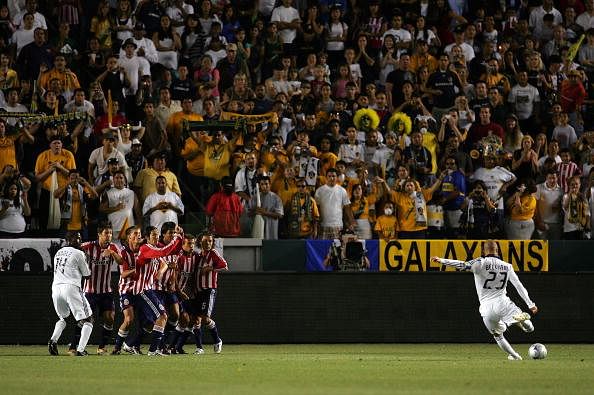
Beckham and Riquelme: The common ground and the contrast
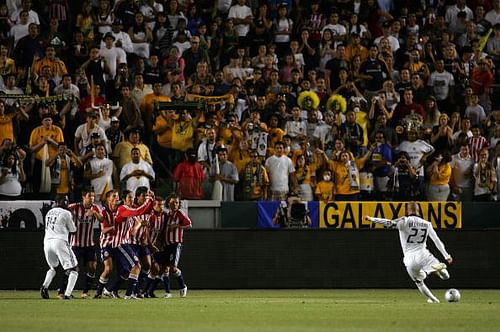
The greatest polarizing moment in all of football is when you see a player standing over the ball around 25-30 meters from goal, trying to score beyond a seemingly herculean and daunting wall of players, and an ever-vigilant custodian guarding the posts. The free-kick: the lethal dead-ball puzzle, that calls upon and challenges the finest players in the team to try and solve. Players like Sinisa Mihajlovic, Garrincha, Zico and Platini are among the many transcendent legends who carved a special niche for themselves in this domain, excelling in the seemingly confounding and metagrobolizing puzzle and earning the tag of the “free-kick specialists”.
The ways to solve the free-kick riddle are varied and different, with distinct players showcasing their own signature algorithms. Some may choose to bend it around the wall while some may try to ‘up and under’ it. For the modern-day footballer, the above two methods may seem a tad old-school. With the advances in the field of manufacturing soccer balls and aerodynamics, they are pretty well-disposed in just hitting the ball on target and trusting the eccentric and anomalous movement in the air to get it beyond the outstretched arms of the goal-keeper.
It isn’t just the algorithm that is amazing to watch, but the elaborate rituals before the actual kick is delivered are also delightfully absorbing. The scene is like the climax of a movie. The cameras are focused on the player going to take the kick, zoomed-in, in an ardent over-optimistic desire to try and read the player’s mind and get a preview on how exactly the free-kick is to be delivered. The players do their best to keep everyone guessing, disguising their messages behind their hands, covering their mouth or saying a word camouflaged behind a cough. The commentators give their previews and predictions; the crowd also dims down into a quiescent state in anticipation of something special and as a mark of pseudo-respect and reverence to the seemingly gargantuan riddle. And when the player in question, does manage to find a way beyond the almost hermetic wall and the outstretched arms of the flying goal-keeper, the stadium erupts into a euphoric and rapturous pandemonium. Special moments need to be savoured and it is moments like these that make the life of a football fan worthwhile.
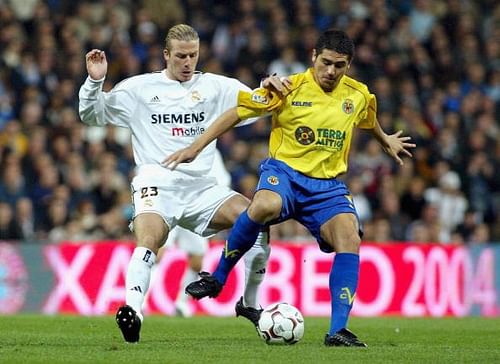
It is amidst these euphoric celebrations that one saw and realized the difference between two true transcendent footballing talents who set many a trend over the last decade. Two players noted and revered for their ability to bend their way over the most impenetrable walls, and score with such aplomb and class that was rare amidst the changing paradigms of the game. Two players who share very different legacies and who at the twilight of their careers are looking at two very contrasting journeys: Juan Roman Riquelme and David Beckham.
Their introduction to the sport was pretty much the same. A Cinderella story maybe, as both of them made their soccer journeys from relatively humble backgrounds into earning a spot at the youth academies of the most prominent clubs in their country. Beckham, an alumnus of the Bobby Charlton Soccer School was inducted into the Manchester United youth academy, and with the likes of Scholes, Butt and the Neville brothers, formed an integral part of the group famed as “Fergie’s Fledglings.” Coincidently, the goal against Wimbledon that catapulted him to greatness was scored with Beckham wearing shoes that were originally designed for a certain Charlie Miller. Did I say a Cinderella story?
Riquelme on the other hand was having a hay day of his own, dribbling his way into the hearts of the Los Xeneizes. Numerous domestic honours beckoned both, as they established themselves as legitimate superstars, albeit showcasing a skill-set much varied.
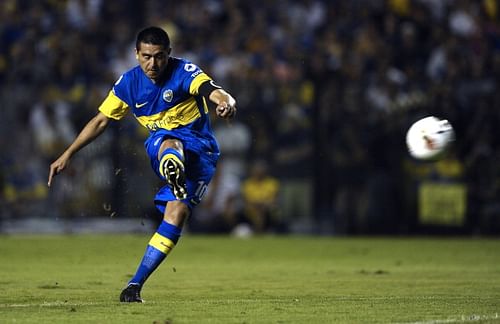
Now, Riquelme was always a greater player, a player who grew up aiming to replicate and mirror the exploits of the legendary Deigo Maradona. By his own admission, “I was lucky enough to grow up during the era of (Diego) Maradona’s, who all Argentinians consider the greatest player ever. After watching him play I used to run out onto the street with my mates, get the ball and pretend that I was him. I’d be commentating on myself and saying “Maradona has the ball”, stuff like that.” And to the Boca Juniors faithful, he did fit the bill perfectly. Smart and astute on the ball, gifted with an exquisite touch on the ball and ability to turn defenders inside out, showcasing the magic and trickery that they had for long celebrated and cherished. They loved him, revered him and upheld him as the successor to Maradona, and he did his bit to uphold their beliefs. Maybe the only thing he lacked was the speed and burst that Maradona had, and yes he was predominately right-footed. Good enough to be a successor and play the role of an ideal enganche or trequartista; maybe still not as good as Maradona but the closest that the Los Bombonera’s had ever seen to their cult superstar.
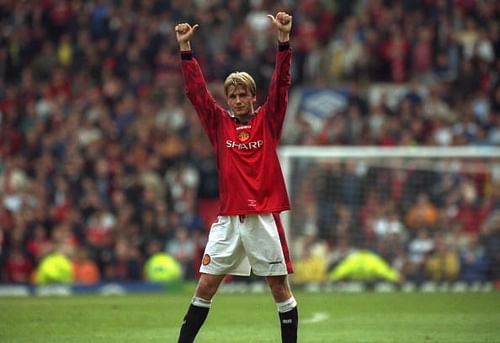
Beckham on the other hand, was never your crafty and mesmerizing dribbler. He didn’t do the turns or the tricks, and his first touch and ball control was pretty ordinary. A Paul Scholes or a Ryan Giggs far surpassed him in this regard. As George Best aptly summed it up, “He cannot kick with his left foot, he cannot head a ball, he cannot tackle and he doesn’t score many goals. Apart from that he’s all right.” Humbling indeed but Beckham was no masquerade – impersonator or a self-eulogizing player. He always knew that he was never going to be like a Pele, dribbling his way through defenders and scoring amazing goals. He knew he wasn’t gifted, but he sure wasn’t ready to accept being a sedentary footballer. Where he lacked with ability, he more than made up with his desire and grit, using his vision and ability to pull off the most difficult of passes and crosses. As Sir Alex famously said, “David Beckham is Britain’s finest striker of a football, not because of god-given talent but because he practices with a relentless application that the vast majority of less gifted players wouldn’t care to contemplate.” He grew up as an ACM, but moulded his game to suit the needs of the team, playing as an RM and excelling at the same position. He wasn’t the flashy winger that maybe Giggs was, but he stuck to his limitations, flanking the by-line and ever ready and available to the mid-field players. He didn’t try to beat players with the dribble, or cut inside and shoot booming banana drives. He chose to stick to his task, look for an opportunity to put the ball in the danger area and create for his team.
It is this grit and the absence of it that defined their careers when they moved to Spain. Riquelme and Beckham both made their move to La Liga, suiting up for Barcelona and Real Madrid respectively. Riquelme was snatched up as more of a political signing by the then coach Van Gaal, who made it clear to Riquelme from the beginning itself that he wasn’t a part of his plans and future for the club. They saw it as a foray into the South American market, and looked at him as a prospect that still needed to mature to suit the Blaugranas. Beckham on the other hand was another addition to the already star-studded conglomeration at Madrid and in many ways, completed the Galacticos. Beckam’s status as a global footballing icon was well documented, and his pop-star celebrity driven off-the field lifestyle made him a superstar for the Los Blancos. The jersey sales were at an all-time high and with the added TRP and public interest, the coffers were for sure ringing.
And it was while at their time in Spain that both had to go through the most tumultuous times of their footballing careers. Times that would challenge their character and force them into uncomfortable corners. It was in the face of such challenges that the world would come face-to-face with the real persons behind the footballing superstars.
Riquelme in his time on loan at Villarreal, came across as a needy, egoistic cult player who needed to feel important and loved all the time. In his mind he was always a Maradona, assuming greatness and playing with an air that defied the pantheon and limits of a small club like Villarreal. He did set the La Liga on fire with his exquisite skill on the ball and his play-making abilities, but his attitude always was too buoyant for the liking of his teammates and fans. It was always like: “Why are you surprised that I made that play. Is it a surprise? This is what I do.” He was repeatedly late for training and always grumpy in the ones he attended. Yes, he did deliver the goods on the pitch, but to the dressing room he was an enigma, a wizard that they needed but didn’t want. The players like Sorin and Martin Palermo weren’t too fond of him, and it required the utmost of efforts by Pellegrini to keep the team focused and play through their differences. A signature image of that would be in the Champions league semi-final against Arsenal when Riquelme missed a crucial penalty that could have taken Villarreal to the final. Pellegrini could have lived with the miss, but couldn’t accept Riquelme’s defiance and indifference. Riquelme famously stated, “I didn’t kill anyone. All I did was miss a penalty.” To him it was a minor aberration, but to the highly competitive and hierarchy-driven footballing world, it was a grave mistake and indifference to it was cruel, something that Pellegrini and the club management weren’t ready to forgive.
Beckham on the other hand came across with a lot of baggage to the Los Blancos. Snubbed by his boyhood club, shunned by a manager who was a father-like figure to him and literally kicked by a boot. Yes, he was a superstar but many believed that him joining the Los Blancos was solely for the monetary benefits and to ramp up the jersey sales and global popularity of the team. While Beckham would want to believe it was for footballing reasons too, his first three seasons at the club went trophy-less and didn’t help him much in his path to vindication. England‘s performance at the World Cup didn’t help him much and with the then coach Steve Mcclaren deciding to omit Beckham from his plans, he was staring at the end of the barrel once again. Memories of 1998 still fresh in his mind, he also remembered his path to vindication. The difference was that he then had the protection and support of a certain Sir Alex; now he had to face up against a resilient Fabio Capello, who didn’t see much value in including Beckham in his plans. Beckham however, was not to be denied, drawing on the spirit that saw him put up an imperious performance against Greece to lead England to the 2002 World Cup. He out-worked his teammates in practice and showcased a professionalism and competitiveness that forced Capello to bring him back into the team. He would then go on to put up a starry display, en route to leading the Los Blancos to the La Liga title and forcing Capello to come out in public and accept that maybe he was wrong in his treatment of Beckham. Madrid tried to sign Beckham and hack his proposed move to the MLS, but Beckham had done his part and had earned his vindication. It was time for him to look for a new challenge, an opportunity to earn a legacy and help the MLS earn its identity.
Beckham might have been the celebrity driven player, but he ensured that he did back it with his performances on the pitch and professionalism off it. He did everything that was diplomatic and correct. He made the right moves, hung out with the biggest stars and earned his way into the hearts and minds of fans all over the globe. They loved him for his looks off the pitch and his earnestness on it. Riquelme on the other hand had a very different fortune. He didn’t understand diplomacy, constantly getting in the wrong books of the coaching staff and the management. To his mind, the professional preaching’s wasn’t of much value as he very much remained a football player and never upgraded into being a football star. He spoke his mind, voiced his disgruntlements without the least concern for its repercussions. His latest feud with Falconi was a major reason why the Los Bombonera came up short in the Copa Liberatados final.
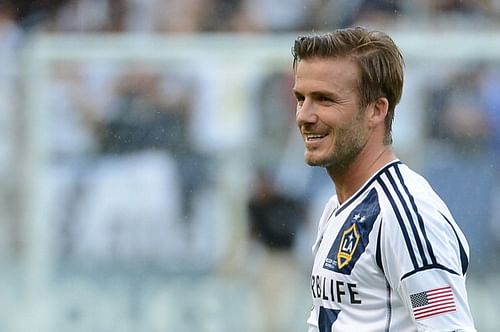
And it is the signing off that aptly sums up the careers of these two players. Beckham had his issues at the Galaxy, and had questions raised about his commitment and professionalism. Riquelme was also faced with similar questions. Beckham came up short for three seasons, and with his place in the England side hanging in the balance, he did have his doubts and almost made a move away to Milan. However, if he had failed in some respects, he was man enough to try and set it right. It came as a pleasant surprise to many when he re-signed with the Galaxy in the year 2011 and led them to two consecutive MLS titles. He met many non-believers on the way but he wasn’t going to be denied. Maybe he didn’t have the legs to do it but he still persevered and fought on. Heart of a champion indeed! A feeling quite alien for the enigmatic Argentinian wizard who signed off the disappointing loss with the following statement: “I love this club, I’ll be eternally grateful, but I feel empty, I have nothing more to give. Now I’m going home and going to a barbecue with friends. I’ll apologize to my 9-year-old son for not having been able to win the cup and I will talk to him.”
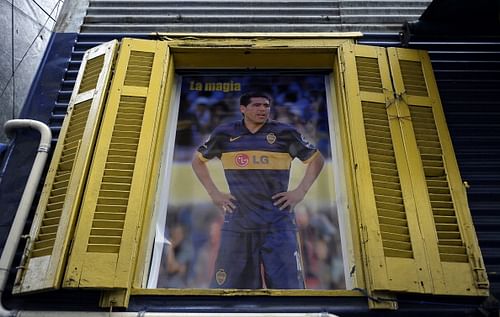
The Los Bombonera faithful still love and revere him and it is not possible for him to shut them out. Yes, the times are dark and the tunnel is deep. It is what calls upon champions to the fore, and Riquelme hasn’t shown enough character and will-power to turn this tirade and earn a legacy that one can cherish. Emotions and the passion to turn people’s opinions and views were never his forte, as he gave away many an opportunity due to his sheer indifference. He wanted to be loved and respected, but when he was denied the same, he always chose to walk away rather than earn it. When Maradona as coach decided to keep him out of the national squad, despite him being the team’s mainstay, he quitted, saying, “I’ve got my way of doing things and it’s not the same as the coach’s. There’s no doubt in my mind that we can’t work together and I’d rather give my place to someone else.”
If only he had the grit and determination of Beckham, we would have been blessed with a much greater football story and legacy.